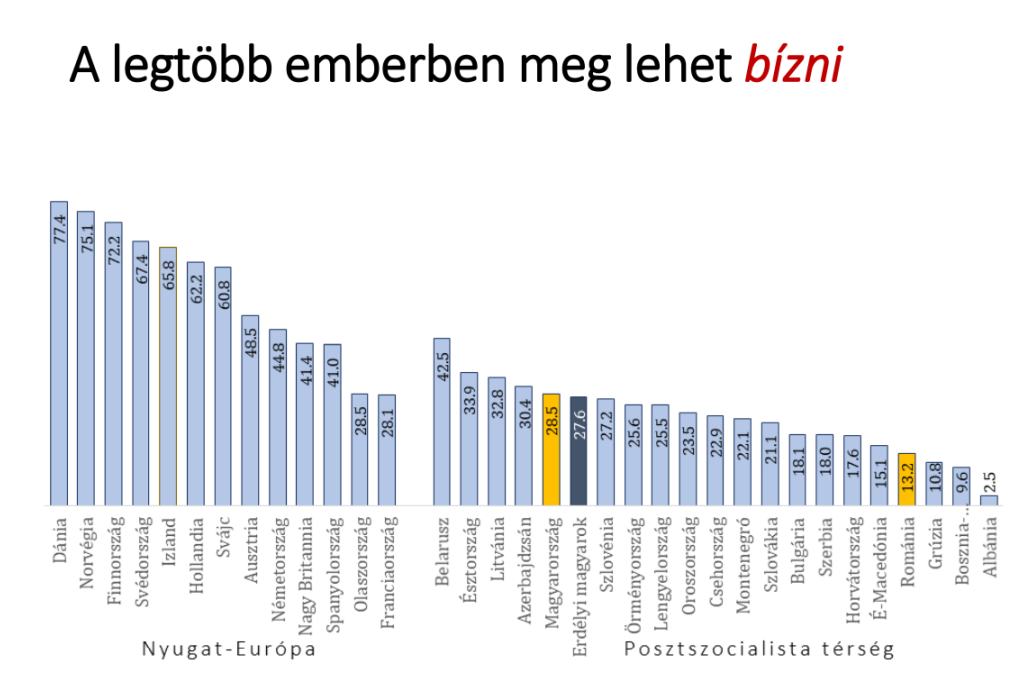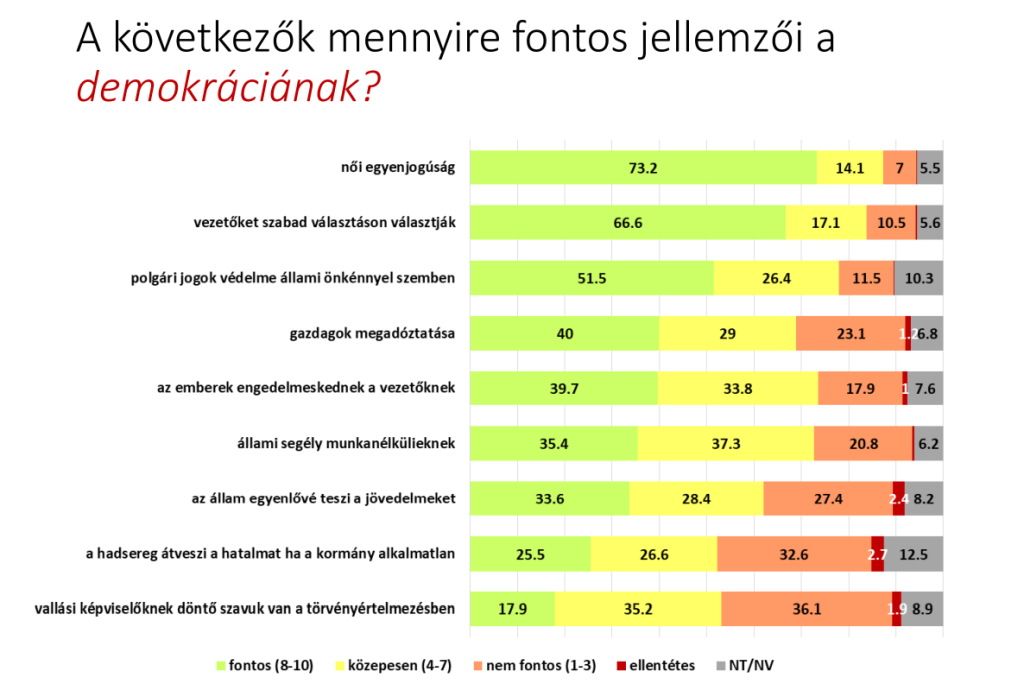Hungarians in Transylvania have much more confidence in people than Romanians in general, and are also more interested in politics; however, they do not trust Romanian institutes, according to the third part of the results from the survey “Hungarians from Transylvania on the European Value Map.” The first part of the survey focused on family, gender roles and religious practices, and the second wave of questions concentrated on immigration and the acceptance of foreign people, while the third part looked at the level of trust in people and institutions, political attitudes and views about democracy. The results were presented by researchers from the Romanian Institute for Research on National Minorities at an online press conference Thursday.
As we presented earlier, this survey is part of the European Values Study (EVS), a large-scale, cross-national survey on basic human values that provides insights into the ideas, beliefs, preferences, attitudes, values and opinions of citizens all over Europe. The newest EVS study was conducted in 42 countries and included, for the first time, national minorities as well, like Swedish people living in Finland or Transylvanian Hungarians.
Romanians do not think people can be trusted
As sociologist Tamás Kiss said at the press event, Transylvanian Hungarians fall in the middle of Eastern European countries when it comes to general trust, as 27.6 percent of respondents said that people can be trusted, a rate very similar to the value recorded in Hungary (28.5 percent). On the other hand, Romanians are less likely to easily trust people, as only 13.2 percent of respondents consider people trustworthy; this rate ranks the country in one of the last positions for post-communist countries.
Kiss also compared the minorities of Europe in this regard, revealing that there are two types of minorities. In the first group, including the Transylvanian Hungarians and Albanians in East Macedonia, general trust is higher than that of the majority of the country. Meanwhile, for the second group – consisting only of the Russian population in the Baltic states – it is the opposite, as their level of trust is significantly lower than that of the majority. This may be related to the fact that the level of organization is lower for the second group compared to the first, maszol.ro reports.

The EVS also analyzed the trust in various institutions. The study shows that Hungarians living in Transylvania trust the church more than Hungarians from Hungary or Romanians, as 78 percent of them trust the church completely or somewhat, compared to 42 percent of Hungarians living in Hungary and 70 percent of Romanians. However, Transylvanian Hungarians’ level of trust in other institutions is significantly lower than that of Romanians: Only 42 percent trust the army compared to 80 percent, 52 percent trust the education system versus 70 percent, 39 percent have faith in the EU compared to 49 percent, and 38 percent trust the justice system versus 47 percent. Tamás Kiss also said that the trust index is lower in those regions where half of the population is Romanian and the other half is Hungarian.
The research also showed that a higher proportion of Transylvanian Hungarians are members of organizations versus Hungarians living in Hungary or Romanians. However, they are members of religious organizations: 40 percent of the respondents are members of such organizations, but probably a significant proportion of those only meant church membership and not some kind of activity, Tamás explained.
Transylvanian Hungarians are more interested in politics than Romanians
Political scientist István Székely said at the press conference that the interest in politics is very low among Transylvanian Hungarians, as only 37 percent of them are very or slightly interested in politics. This rate is higher than Romanians (32 percent) but lower than the rate measured in Hungary (46 percent). Compared to other minorities, Transylvanian Hungarians are in the middle in this regard.
The survey also measured the political attitude, left-right views of the respondents, which revealed that Transylvanian Hungarians are more right-wing than Hungarians or Romanians; they are also the most right-wing in the post-communist region. However, Székely pointed out that it was a very contextual question, underlining the fact that 35 percent of Transylvania Hungarians could not answer the question, did not understand it, or could not decide on which side they stand.

When asked to name the main characteristics of democracy, 73.2 percent of Transylvanian Hungarians mentioned women’s equality, 66.6 percent noted the free election of representatives, and 51.5 percent said the protection of civil rights. This is not identical with the data of Romanians or Hungarians living in Hungary: 75.2 percent of Romanians mentioned protection of civil rights, 72.4 percent answered the free election of representatives, and 71.8 percent said equality, while Hungarians from Hungary consider equality and free elections to be equally important (79.6 percent and 79 percent).
The survey also asked if the state has the right to monitor public spaces with security cameras, track e-mail and other information exchanged over the internet, or collect information about anyone, even without their knowledge. According to the results, 81 percent of Transylvanian Hungarians agree with outdoor camera surveillance – making them the most tolerant in this regard in the post-communist region – but only 18 percent would authorize the state to track e-mails and information exchanged on the internet; 13.6 percent would allow the government to collect information about anyone, even without their knowledge.
The last questions of the study focused on the extension of the EU, analyzed if people would fight for their country, and measured the importance of environmental protection. The results show that Transylvanian Hungarians do not think the EU should be further expanded; they are less against it than Hungarians but more opposed to this than Romanians.
In the case of war, 43 percent of Transylvanian Hungarians would and 41.5 percent would not fight for their country – 46.7 percent of Romanians and 53 percent of Hungarians would fight for their country. According to the researchers, the fighting spirit of minorities does not reach the spirit of the majority, but the Hungarians of Transylvania are the closest to the majority among all the minorities surveyed.
According to the study, 71 percent of Transylvanian Hungarians would prioritize environmental protection, even if it slows down economic growth or causes job losses. This rate is significantly higher than the Romanian value (50 percent).
Title image: The Saint Michael Church in Kolozsvár/Cluj-Napoca. Photo: Kolozsvári Magyar Napok